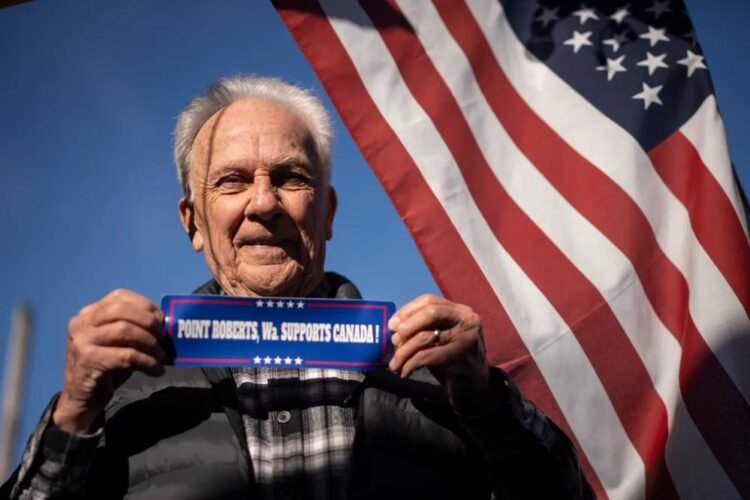POINT ROBERTS, Wash. — Nestled in the northwest corner of Washington state, the small, isolated town of Point Roberts has long depended on a unique relationship with Canada. But as tensions between the two nations escalate due to President Donald Trump’s trade policies, the town’s future is becoming increasingly uncertain.
Local businesses, from the only grocery store to the few restaurants that serve both residents and visitors, are feeling the strain. Many in the community, including those who never supported Trump, fear that without Canadian patronage, their town won’t survive.
A Town on the Brink
“This is devastating,” says Tamra Hansen, a longtime resident and business owner. Fighting back tears, she explains how her two restaurants are struggling to stay afloat. “Without Canadian customers, this town will die.”
Point Roberts, a five-square-mile exclave, is surrounded by water on three sides and connected to the mainland only through Canada. To reach any other part of the U.S. by car, residents must cross the border into Canada, travel 25 miles to Vancouver, B.C., and then re-enter the United States. This geographical quirk, the result of an 1846 border agreement, has historically fostered close ties with Canada. However, recent trade disputes are threatening that relationship.
For decades, Point Roberts has thrived as a retreat for Canadians who own vacation homes and visit regularly. But now, many are staying away. Some Americans in town even report feeling hostility when they travel across the border.
Christopher Carleton, the local fire chief, describes Point Roberts as one of America’s last untouched natural gems, but he worries that politicians unfamiliar with the town’s way of life are putting its future at risk. “We need to support each other, not let outsiders who don’t even know we exist dictate our relationships,” he says.
Rising Tensions and Economic Fallout
The already delicate balance between the two nations has been upended by Trump’s ongoing threats to impose tariffs on Canadian imports. Canada has responded in kind, sparking the worst diplomatic crisis in modern U.S.-Canada relations.
Many Canadians take issue with Trump’s comments, particularly his suggestion that Canada could be America’s “51st state.” Mark Nykolaichuk, a Vancouver resident who frequently visits Point Roberts, says he avoids traveling to the mainland U.S. but makes an exception for this town. “The border here never felt like a barrier before,” he says.
Most properties in Point Roberts are owned by Canadians, and many of the town’s roughly 1,000 permanent residents hold dual citizenship. The town once thrived on fishing, but its economy now depends heavily on tourism and retail, fueled by Canadian visitors. According to U.S. Census data, retail is the town’s largest industry, but businesses are now seeing drastic declines in revenue.
The town’s only grocery store, Point Roberts International Marketplace, has reported a 20-30% drop in business. Nykolaichuk is doing what he can to help by shopping locally, but he worries about the long-term impact. “If this store closes, where will the people here buy their food?” he asks.
Many in Point Roberts understand Canada’s frustration but feel trapped by political decisions beyond their control. “We’ve always had a great relationship,” Hansen says. “Now, the U.S. is suffering too, and it just doesn’t make sense.”
Businesses on the Edge
Larry Musselwhite, owner of Larry’s Liquor Locker, is among those who blame Trump for the town’s economic downturn. He’s seen his sales drop 40% in the past month. At 75 years old, he had hoped to retire soon, but now that seems impossible. “Our president doesn’t care about ordinary people and what we’re going through,” he says. “This affects everything about my life.”
Point Roberts overwhelmingly voted against Trump in the 2024 election, with about 75% of residents supporting other candidates—higher than the county and state averages.
One of the biggest challenges is the unpredictable nature of the tariffs. They’ve been introduced and withdrawn multiple times, creating confusion at customs. Residents who cross the border daily are unsure if they’ll be hit with unexpected fees, making them hesitant to shop or travel.
Hugh Wilson, a real estate agent managing Airbnb properties in town, says uncertainty has led to more cancellations than bookings. “No one knows what the rules will be from one day to the next,” he says. “Even the border agents are doing their best to keep up.”
Fears of a Cutoff
Beyond economic concerns, there’s an even greater fear: what if Canada decides to cut essential services? The country supplies both water and electricity to Point Roberts. Brian Calder, a fourth-generation resident and former Chamber of Commerce president, warns that if tensions escalate, Canada could simply turn off the tap. “If this situation gets worse, they could cut off our water and power overnight,” he says. “It all depends on how far Trump wants to push this.”
Local leaders are reaching out for help, but their options are limited. Calder and others have appealed to the British Columbia premier and Washington state’s governor, hoping they’ll intervene. However, they feel abandoned by their own county government.
Jed Holmes, a spokesman for Whatcom County, acknowledges their concerns but says international trade disputes are beyond the county’s control. “We understand people want action, but it’s difficult to see what a county government can realistically do to change an international situation,” he wrote in an email.
A Community in Crisis
For Hansen, the crisis is deeply personal. She employs 15 people at her two restaurants, but business is down 55% from last year. Some days, her pub barely makes $100. “Businesses are closing as we speak,” she says. “This is my home, and I care about everyone here.”
With no clear resolution in sight, Point Roberts remains caught in a political storm that threatens its very survival. Once a symbol of cross-border harmony, the town is now a casualty of a trade war it never asked for.

 English
English



























































